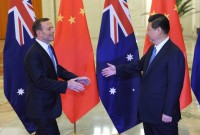Australia’s FTA with China: will it benefit us?
 Back in April of this year, a free trade agreement (FTA) between Australia and Japan was settled upon and the official signing of an FTA between Australia and South Korea took place.
Back in April of this year, a free trade agreement (FTA) between Australia and Japan was settled upon and the official signing of an FTA between Australia and South Korea took place.
Now, Prime Minister Tony Abbott has confirmed that the FTA settled on between Australia and Japan was signed this week, effectively removing many barriers and related taxes that could have made trading between the two countries less appealing in the past.
Currently, however, the Australian government is still engaged in discussions with China to reach a bilateral FTA with them. Having recently conducted its 20th round of negotiations with the country, the progress towards reaching an FTA with China has been slow. Initial negotiations started all the way back in 2005. Overall, negotiations have stalled as the Australian government has not been satisfied with the form of an FTA that China wants to agree to. The basic explanation is that the Australian government wants the FTA to be more extensive, whereas China wants one with certain restrictions.
While there is no guarantee of when a proper agreement will be reached, Tony Abbott is hoping to come to some form of definitive agreement before the end of 2014. This would effectively bring negotiations to a close and finally allow Australia and China to sign-off on a deal that could break down substantial barriers to trade between the two countries.
Would an FTA between Australia and China benefit us?
Undoubtedly an FTA would help simplify trading between the two nations in regards to numerous goods and products, effectively reducing the cost of applicable taxes. A free trade agreement doesn’t mean every point of trade will be free or without tax, but costs will drop. Thresholds related to when tax is implemented for certain products are often raised, and then the tax costs themselves can be less severe. An improved system of import/export can also increase job demand and see more jobs opening up for Australians.
Of course, one of the key concerns people have voiced surrounding an FTA with China is that if goods/products can be more freely imported/exported between the countries, this could lead to an increase of cheaper goods making their way in from China. While cheaper goods isn’t necessarily a bad thing, these cheaper alternative could naturally impact on the sale of local goods. And because China products may not need to adhere to as strict regulations as Australian products, there’s the potential for unforeseen dangers to emerge.
But this is a concern when considering free trade with any country. Different countries have different customs, different regulations and restrictions. But when an FTA is made with another country, this typically means rules surrounding import/export are increased to account for such regulatory differences.
As a whole, an FTA with China would benefit us. The strength of any nation’s economy does rely on import and export. The more you export, the more valuable your country’s goods/products are considered to be. This, in turn, works in favour of boosting a nation’s economy and associated value of its currency.
Would you be in support of an FTA between Australia and China? Let us know in the comments below.